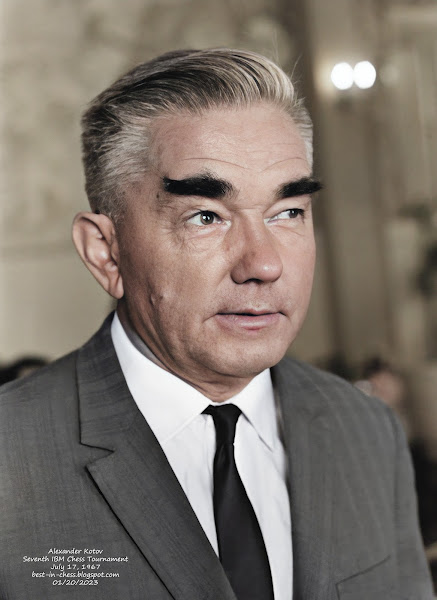Additional Games
Alexander Alexandrovich Kotov
August 12, 1913 - January 08, 1981
February 23 1948
July 17 1967
The Ottawa Citizen, Ottawa, Ontario, Canada, Tuesday, July 06, 1954
Canada's Masters Impress
By Stan Westall, Canadian Press Staff Writer
Toronto (CP)—Alexander Kotov thinks Canada has a great future in international chess.
After playing Abe Yanofsky of Winnipeg and other top-flight players from Ottawa and Hamilton, Kotov, a Russian grand master, says: “Canada has a good chance of winning the international tournament at Buenos Aires in September.”
And he has yet to play two Montreal champions before leaving Canada Friday.
Kotov and co-starring colleague Igor Bondarevsky of Leningrad, have spent nearly two weeks discovering the calibre of Canadian chess players.
In Winnipeg, Bondarevsky played 40 games simultaneously. He won 38, drawing two.
In Ottawa, he and Kotov played four-at-a-time exhibition matches, winning them all.
In Toronto Monday, they played Paul Vaitonis, 1951 Canadian champion, and Frank Anderson, 26-year-old current co-champion with Yanofsky.
Anderson defeated Bondarevsky in 44 moves and Kotov beat Vaitonis in 50 moves.
Welcomes Interview
The 41-year-old Kotov welcomed an interview Monday.
“I like talking to Canadians,” said the Moscow engineer, who speaks English with a thick accent.
So we stood in the dark corridor of a Toronto hotel—Kotov's room was being cleaned at the time—and talked about chess. Niagara Falls, chess, Canada in general, and chess.
Bondarevsky interjected an occasional word in German, his other language. And he nodded enthusiastically when Kotov mentioned Niagara Falls.
“We have wanted to see the Niagara Falls since we were young men,” Kotov explained. “It was breath-taking.”
They paid a week-end visit to Niagara, escorted by chess expert Bernard Freeman of Toronto.
Bondarevsky was born in Leningrad, and began playing chess at the age of 12. In 1937 he was titled chess master. He received the honor of grand master in 1941, when he became champion of the Soviet Union.
Edited Chess Classic
He edited Grigoriev's recently-published classic on pawn and rook endings and elaborated such important opening systems as the queen's gambit and the Dutch and French defences.
Alexander Kotov studied chess in his birthplace of Tula, a city near Moscow. He moved to the capital to graduate in mechanical engineering. He was 14 when he began playing chess seriously, became a master at 25, grand master at 26 and Soviet champion at 35.
He holds the Order of Lenin for engineering. He is also the author of a book on Alexander Alekhine, one of the world's greatest chess masters. Kotov has presented copies of this book to Canadian players.
Beaming and gesturing emphatically with large, well-manicured hands, Kotov explained why Russians are such good chess players.
“We have help from the government,” he said.
(While Russians are playing international chess they are granted leave of absence from their jobs with full pay.)
“But so do the players of Argentina, Hungary, Czechoslovakia and Yugoslavia,” he added.
“Chess is a tradition in our country. Also we are a people who like to think deeply about things.”
What do the Russians think of Canada, apart from the chessboard?
Speaking for both of them, Kotov said:
“So far, I have not had time to see the differences between our countries. All I have seen are the similarities. The houses are going up, the factories are being built, there is an atmosphere of vitality, of energy…so it is in Russia.”

























